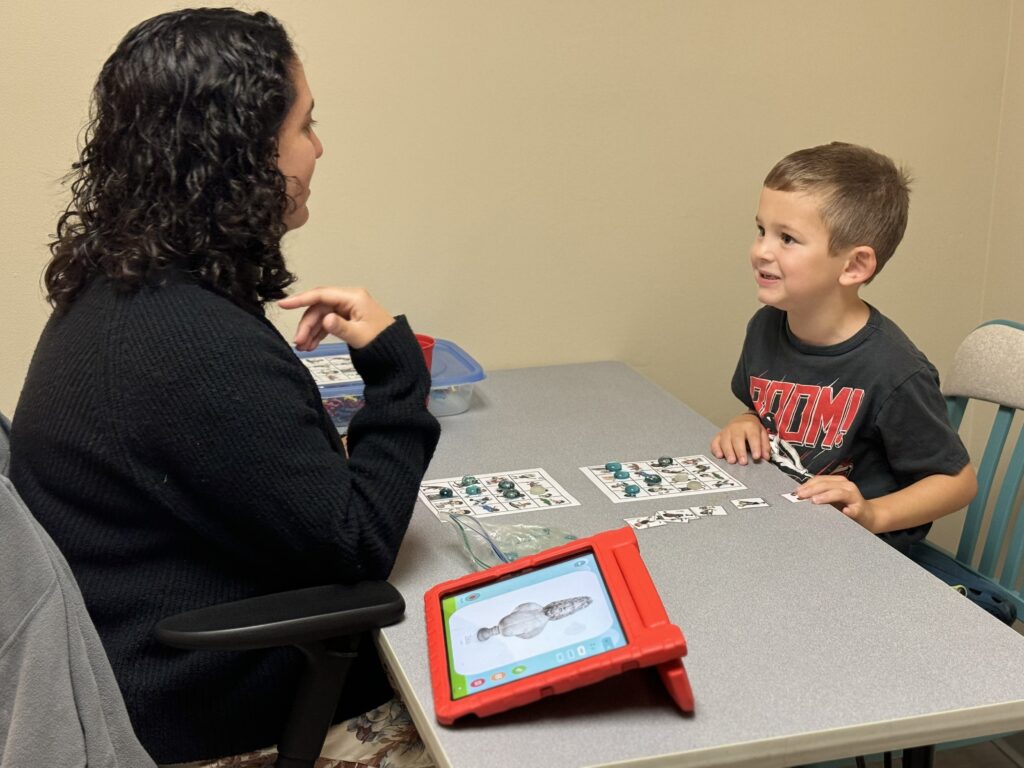Language Disorders/Delays (for older preschool and school-aged children)
When Talking Isn’t Enough: Understanding Language Difficulties in Verbal Children
Is My Child Behind in Language, Even Though They’re Talking?
It is easy to assume that once a child starts talking, their language development is on track. But many parents notice that, even though their child speaks, something still feels off.
- “She doesn’t talk as much as the other kids.”
- “He uses short sentences, even though he’s already four.”
- “She talks all the time, but I can’t always understand what she’s trying to say.”
If this sounds familiar, you’re not alone. It’s possible for children to speak but still have difficulties with language—how they understand and use words, sentences, and ideas to communicate effectively.
What Should My Child Be Saying?
Language Milestones for Ages 3 to 6
Children develop at their own pace, but here are general guidelines for what’s expected:
By Age 3:
- Speaks in 3–4 word sentences
- Asks simple questions (“Where’s Daddy?”)
- Follows 2-step instructions
- Talks about familiar things
By Age 4:
- Uses longer, complete sentences
- Begins using past tense and plurals
- Tells short stories or recalls recent events
- Is mostly understood by familiar adults
By Age 5:
- Expresses ideas with more detail
- Uses more complex grammar (e.g., “because,” “if”)
- Talks about thoughts and feelings
- Understands and answers “why” and “how” questions
By Age 6:
- Holds conversations with peers and adults
- Uses clear story structure (beginning, middle, end)
- Understands jokes and wordplay
- Follows longer instructions and explanations
If your child seems to be behind in several of these areas, it may be a sign of a language delay or difficulty.
What Are Language Difficulties in Verbal Children?
Not all language delays are obvious. A child may be talking, but:
- Uses short or simple sentences for their age
- Struggles to find the right words
- Repeats phrases without understanding them
- Talks off-topic or has trouble staying in a conversation
- Uses incorrect grammar
- Has difficulty answering questions or following instructions
- Uses vague words like “that thing” or “it” frequently
These difficulties can affect how children connect with others, learn in school, and express themselves clearly.
What Can I Do at Home?
There are simple ways to support your child’s language every day:
- Model rich language: Narrate what you’re doing and describe what you see.
- Expand their language: If your child says, “Dog bark,” respond with, “Yes, the big dog is barking loudly.”
- Read together: Talk about the pictures, characters, and events in the book.
- Ask open-ended questions: Encourage thinking and talking beyond yes/no.
- Give extra time: Wait patiently for your child to respond—avoid rushing or filling in words.
- Use daily routines: Mealtimes, bath time, and playtime are great opportunities for conversation.
How Can a Speech Therapist Help?
At Magic Beans, our certified Speech-Language Therapists are trained in a wide range of evidence-based language therapy approaches to support children with speech and language difficulties. We begin with a detailed assessment of your child’s communication skills, then design an individualised therapy plan based on their specific needs and learning style.
Therapy may focus on:
- Expanding vocabulary and sentence structure – Helping children learn and use a wider range of words and form age-appropriate sentences
- Improving grammar and word order – Teaching rules of language to improve clarity and sentence formation
- Strengthening listening and comprehension – Supporting your child in understanding spoken language, following directions, and processing information
- Supporting storytelling and conversation – Developing the ability to retell events, express ideas clearly, and engage in back-and-forth conversations
- Building social communication skills – Teaching turn-taking, topic maintenance, and interpreting body language and tone
Our therapists at Magic Beans are trained in several specialised, research-based programs that help children make meaningful progress, including:
- Visualizing and Verbalizing® – A structured program that strengthens language comprehension by helping children create mental images as they listen or read. This improves memory, understanding, and the ability to describe ideas in detail.
- Hanen It Takes Two to Talk® – An internationally recognised parent training program that empowers caregivers to build their child’s language during everyday routines and interactions.
- Story Grammar Marker® – A visual and interactive tool that helps children organise and retell stories, improving narrative skills, sequencing, and overall expressive language.
- Expanding Expression Tool (EET) – A multi-sensory approach that supports children in expanding their descriptive language, vocabulary, and oral/written expression through a structured framework.
- Shape Coding® – A visual system using colours and shapes to teach grammar and sentence structure, particularly beneficial for children with developmental language challenges.
Our sessions are play-based, interactive, and engaging, so children stay motivated and enjoy learning while developing strong communication skills. With expert guidance and family involvement, we help children become confident communicators—both in therapy and in everyday life.
Will My Child Catch Up?
Some children with mild delays do catch up, especially with a language-rich environment and supportive adults. However, others need direct intervention to close the gap—and early support makes a big difference.
Children who receive help early tend to make faster, more lasting progress than those who wait until later school years.
What Happens If Language Difficulties Are Left Untreated?
Without support, language difficulties can persist and lead to:
- Trouble with reading and writing
- Difficulty understanding classroom instructions
- Frustration in social settings
- Lower self-confidence
- Challenges with academic performance and learning
The impact can carry into the school years and beyond, affecting a child’s ability to thrive socially and academically.
When to Seek Help
If you’re unsure whether your child is developing language as expected, it’s okay to ask questions. A professional assessment can give you clarity and direction.

